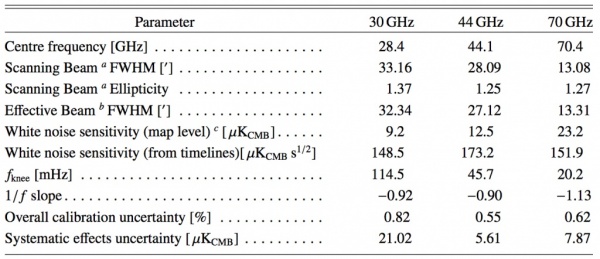Summary of LFI data characteristics
The LFI performance are summarized in Table 1 below. All the details can be found in the LFI data processing paper Planck-2013-II[1].
Summary of LFI Performance[edit]
A summary of the LFI performance parameters is given in the table 3 below.
| Parameter | 30 GHz | 44 GHz | 70 GHz |
|---|---|---|---|
| Center frequency [GHz] | 28.4 | 44.1 | 70.4 |
| Scanning beam FWHM [arcmin] | 33.10 | 27.94 | 13.08 |
| Scanning beam ellipticity | 1.37 | 1.25 | 1.27 |
| Effective beam FWHM [arcmin] | 32.29 | 27.00 | 13.21 |
| White noise level in map [K] | *TBD | *TBD | *TBD |
| White noise level in timelines [K] | 148.1 | 174.2 | 152.0 |
| f [mHz] | 114.1 | 52.4 | 19.7 |
| 1/ slope | -0.92 | -0.88 | -1.20 |
| Overall calibration uncertainty [%] | *TBD | *TBD | *TBD |
| Systematic effects uncertainty [K] | *TBD | *TBD | *TBD |
Determined by fitting Jupiter observations directly in the timelines.
Calculated from the main beam solid angle of the effective beam, . These values are used in the source extraction pipeline Planck-2013-XXVIII[2].
White noise per pixel computed from half-ring difference maps. These values are within 1% of the white noise sensitivity computed directly on the timelines, taking into account the actual integration time represented in the maps.
Values derived from fitting noise spectra.
Sum of the error on the estimation of the calibration constant (0.25 %) and the square root of the squared sum of the following errors: beam uncertainty; sidelobe convolution effect; and unknown systematics as measured from the power spectrum at (see Planck-2013-V[3].
Peak-to-peak difference between 99% and 1% quantities in the pixel value distributions from simulated maps (see Planck-2013-III[4].
Table 1. Summary of the LFI performance parameters

References[edit]
- Jump up ↑ Planck 2013 results. II. Low Frequency Instrument data processing, Planck Collaboration, 2014, A&A, 571, A2
- ↑ Jump up to: 2.02.1 Planck 2013 results. XXVIII. The Planck Catalogue of Compact Sources, Planck Collaboration, 2014, A&A, 571, A28
- Jump up ↑ Planck 2013 results. V. LFI Calibration, Planck Collaboration, 2014, A&A, 571, A5
- Jump up ↑ Planck 2013 results. III. Low Frequency Instrument systematic uncertainties, Planck Collaboration, 2014, A&A, 571, A3
(Planck) Low Frequency Instrument
Full-Width-at-Half-Maximum
Cosmic Microwave background
To be defined / determined